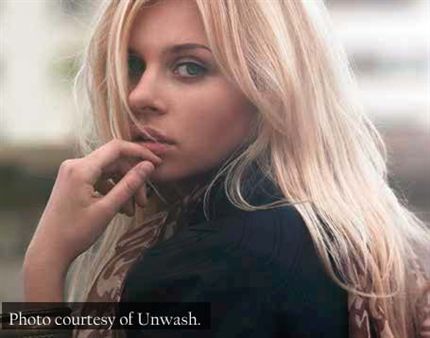Is Shampoo Obsolete? The New Wave of Cleansing Conditioners
By Jackie Summers
Is “lather, rinse, repeat” going the way of the flip phone? First it was dry shampoo—a new product category that allows clients to skip a day or two or three between shampoos. These formulas give overworked midlengths and ends a rest while absorbing debris and oil from the scalp area.

Now the cleansing buzz is building over another trend—cleansing conditioners. Also referred to as co-washing by many, cleansing conditioners are typically shampoo-free formulas that cleanse, balance and refresh the hair without stripping or depleting its natural oils and nutrients. Because they’re shampoo-free (no-poo) they don’t suds up. A few—Devacurl’s No-Poo, Wen—have been around for a while. Others are new to the scene. The practice of co-washing has long been practiced within the African American community because too-frequent shampooing can lead to dryness, damage and unwanted frizz on highly-textured hair types.
Confused? Wondering if co-washing is right for your clients? Here are the answers to some frequently asked questions!
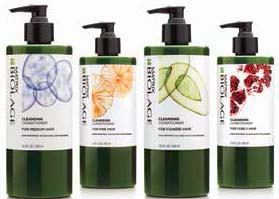
Q: What is the difference between shampoo and cleansing conditioners?
A. Traditional shampoos rely on detergents that are chemically attracted to the dirt in your client’s hair. They’re distributed by rubbing, scrubbing and lathering, and when they’re rinsed, hair often feels squeaky clean—which isn’t always a good thing if it tends to be dry or damaged. That leads to the need to apply conditioner to add back moisture. The newest cleansing conditioners claim to gently remove dirt and debris without lather or detergents, and at the same time, maintain the proper moisture balance. Think two for the price of one—cleanse and condition.
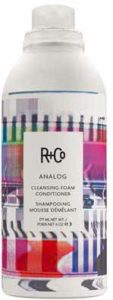
Q: Who should co-wash?
A. “Anyone who struggles with ‘shampoo strip,’” believes Brandon Schwartz, Director of Marketing for Unwash, “or anyone who avoids using shampoo because it compromises their hair of natural oils, moisture, color and impacts hair integrity.” Adds Nicole Simpson, Director of Innovation for Macadamia Professional, “Clients with normal-to-coarse hair and curly, coiled hair types are ideal candidates.”
Q: Who should NOT co-wash?
A. Clients with extremely oily hair may not be the best candidates, as well as clients with scalp conditions such as dermatitis. Also, says R+Co’s Howard McLaren, “People with extremely dry hair may need additional conditioning if they co-wash. However, over time with co-washing, hair begins to feel more moisturized as the oils rebalance.”
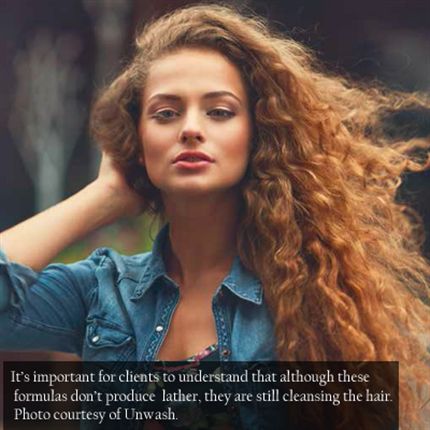
Q: Can clients switch off between co-washing and conventional shampooing?
A. Most co-wash advocates feel that it’s not necessary. “Our No-Poo is truly a cleanser with conditioning properties,” says Devacurl VP of Education, Shari Harbinger. “It’s free of sulfates so it’s hard to imagine anyone who understands the perils of drying sulfates would ever want to use shampoo again.” Agrees McLaren, “R+Co Analog is a cleanser that is designed to rebalance the scalp oils that occur from over-washing, so users shouldn’t need a shampoo as well.” On the other hand, however, some clients may choose to refresh their hair and scalp with a sulfate-free shampoo from time to time, to remove excess oil and/or product buildup.

Q: Can co-washing be done in the salon?
A. “Absolutely!” declares Schwartz. “We find that when our Unwash Bio-Cleansing Conditioner is used at the backbar, the shampoo time is faster because there’s no need to condition, it reduces blow-dry time, it’s gentle for hair after color services and the finished texture is shiny and healthy.” Adds Simpson, “Who better than a stylist to determine if this formula is right for her client’s hair, to show her how to use the product and to answer her questions?”

Q: What questions do clients most frequently ask?
A. How does it clean if it’s not a shampoo? Is it really cleaning my hair? To answer the first question, Brandon and his team at Unwash provide the following scientific explanation: “Shampoo uses anionic surfactants which latch onto water and are carried through the hair, stripping all oils as they go, leaving the strand vulnerable, dry and damaged. Cleansing conditioner uses cationic surfactants, which cleanse hair of unwanted oils and buildup, but instead of stripping the strand, leave behind a lightweight layer of conditioner to protect and hydrate.” Bottom line? “Once they get past the fact that these products don’t lather,” says Nicole, “they will be fine!”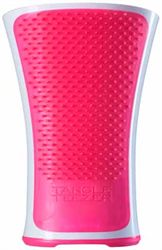
Ready to join the co-washing revolution? The Tangle Teezer Aqua Splash is here to help! With its hollow design and strategically spaced teeth, it will help you distribute cleansing conditioners quickly and evenly from top to tip. Check it out!
The Products
Unwash Bio-Cleansing Conditioner – “Our formula is thinner and more easily distributed throughout the hair for better coverage and rinseability,” says Unwash’s Brandon Schwartz. “That makes it suitable for all hair types.”
Macadamia Professional Flawless – “Flawless contains a Pro Oil complex of Macadamia and Argan Oils that provide superior hydrating while nourishing the hair fibers,” says Macadamia Professional’s Nicole Simpson.
R+Co Analog Cleansing Foam Conditioner – “Distribution is always part of our formulas,” says R+Co’s Howard McLaren. “Analog is a conditioner that cleans hair. If we had created a liquid form, it would have been amazing, but we created an aerosol mousse that takes it to the next level.”
DevaCurl No-Poo – “No-Poo cleanses and conditions the scalp and hair with the pH necessary to create an antiseptic environment,” says DevaCurl’s Shari Harbinger. “It successfully removes dirt particles and product buildup like silicone or hairspray.”
Matrix Biolage Cleansing Conditioners – “These formulas whisk away dirt without removing natural lipids, the provide targeted, deep conditioning to moisture-depleted hair fibers,” says Matrix Celerity Stylist, George Papanikolas. “There is none of the heavy buildup that is common with some all-in-one cleansing and conditioning products. Plus, clients can select formulas specifically designed for their hair type—Fine, Medium, Coarse or Curly.”



